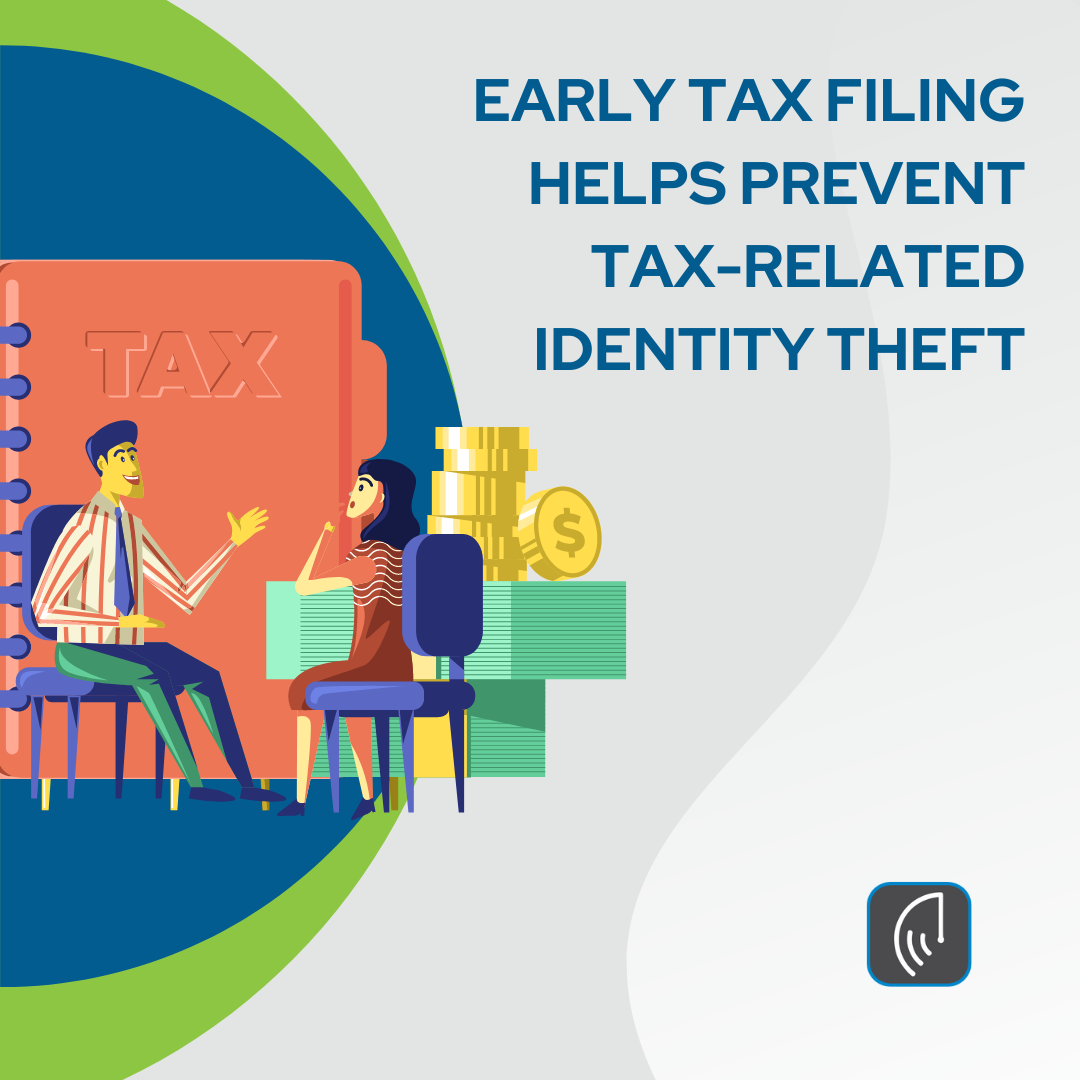Did you know that individual tax refunds are a popular target for cybercriminals seeking to profit from stolen identities? And that early tax filing helps prevent tax-related identity theft. According to the IRS, tax returns with confirmed cases of identity theft continue to increase year over year. Taking the necessary precautions to protect yourself from tax-related identity theft is important, and filing your taxes early is one of the best ways to help safeguard your identity Discover why the IRS advises taxpayers to file as soon as possible, as well as the most common warning signs of tax-related identity theft.
Tax-Related Identity Theft: What Is It?
Tax-related identity theft occurs when a criminal claims a tax refund using a stolen Social Security number in the victim’s name. The victim may spend months correcting false deductions, incorrectly reported income, and other issues with their tax return.
According to the IRS, tax-related identity theft is one of the most prevalent tax scams. It is particularly common during tax filing season when taxpayers are preparing their returns either on their own or with the help of a tax professional. The victim is often unaware of the fraud until their tax return is rejected because a criminal has already filed a return using the same Social Security number.
Why the IRS Encourages Early Filing
With good reason, the IRS continues to advise taxpayers to submit their returns as soon as possible.
Because the IRS only accepts one tax return per Social Security number, a taxpayer may be able to beat an identity thief to the punch if they file their legitimate tax return before a potential criminal file their fraudulent one. If, on the other hand, a criminal is successful in filing their fraudulent return first, the victim may have to wait months to resolve issues with the return.
As soon as taxpayers have required paperwork, including W-2s, 1099s, and mortgage interest statements, file as soon as possible. Of course, taxpayers should follow the advice of the financial or tax professional they have retained.
Identify the Red Flags
The IRS advises taxpayers to be on the lookout for the following common warning signs:
- An IRS letter inquiring about a suspicious tax return
- Rejected E-Filing due to a previous filing using the same Social Security number.
- The victim received a tax transcript in the mail without asking for one.
- An IRS notice indicating that an online account in the victim’s name has been created, accessed, or disabled, even though the victim took no action.
- An IRS notice stating that the victim has been subject to collection actions for a year in which they failed to file a tax return, additional taxes are due, or that their refund has been offset
- IRS records indicating earnings from an employer unknown to the victim.
What Should You Do If You Believe You Are a Victim of Tax Identity Theft
If you believe you are the victim of tax-related identity theft, the IRS, and the Federal Trade Commission (FTC) advise you to take the following steps:
- Respond to any IRS notice as soon as possible by calling the phone number provided.
- If your e-filed return is rejected because of an existing filing under your Social Security number, file an identity theft affidavit (IRS Form 14039) electronically at IdentityTheft.gov, or as directed by the IRS. The FTC recommends downloading and saving a copy of the report for your own records.
- Even if you must mail your tax return, keep up with your tax filing and payment obligations. Notifying the IRS or the FTC about suspected tax identity theft DOES NOT relieve you of the obligation to pay taxes.
- Consider requesting a copy of the fraudulent return from the IRS with certain details redacted. The information could help you figure out what the thief knows about you and your family.
- Consider placing a fraud alert, an extended fraud alert, or a credit freeze, as recommended by the FTC.
- Close any financial or credit accounts that were opened or altered by getting in touch with your financial institutions.
Individual tax refunds are a popular target for cybercriminals seeking to profit from stolen identities. Filing your taxes early is one of the best ways to help safeguard your identity. These protective measures can help you prevent further identity theft and provide peace of mind. Early Tax Filing Helps Prevent Tax-Related Identity Theft! Additionally, filing taxes early helps ensure that any refunds are received in a timely manner.
Related Article:
2021’s ‘Dirty Dozen’ Tax Scams
